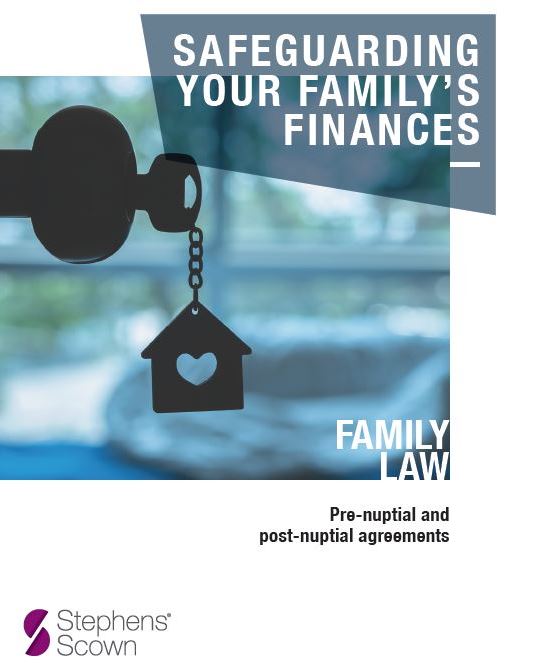Inherited and Pre-Marital Assets
Inherited assets or pre-marital assets can become a focal point in financial negotiations on divorce. This is because there are often significant arguments about how they should be treated on divorce, and there have been numerous cases which have tried to assist in the determination of how those assets should be treated on the breakdown of a marriage.
Discussions can arise over the extent to which inherited assets or premarital assets should be ring-fenced in the context of a divorce, and therefore not shared but retained by the spouse who established or inherited the assets. An ‘absolute’ ring-fence may be appropriate in some cases, while in others the entire class of asset might be regarded as a matrimonial asset like any other.
Much depends on when the asset was acquired, whether the asset is required to meet needs, and how the asset has been treated during the marriage. For example, did it become a shared asset that both contributed further to and/or benefitted from? There is often a greater prospect of ring-fencing if the asset has not been shared with or enjoyed by the non-inheriting spouse.
Our Family team features proven specialists in this area of law, and provides expertise in securing the best outcomes.

Pre-marital assets
Pre-marital assets can have a special status when a couple are divorcing. Depending on the circumstances of the case, there can be arguments that those assets should be retained by the person who brought them to the marriage. This argument can be weakened if the marriage is long, the assets have been shared with the other party to the marriage, and/or are required to meet the needs of both parties in the event of a separation.
What are pre-marital assets?
Pre-marital assets are those assets which a party to a marriage or civil partnership had prior to the marriage. If there was a period of co-habitation before the marriage, the term can also be used to describe those assets which a party had prior to the co-habiting relationship. Such assets can include:-
- Savings
- Pensions
- Property
- Chattels such as heirlooms
- Business including company and partnership interests
Pre-marital assets in divorce
On divorce, pre-marital assets can often be retained by the person who owned the asset prior to the marriage or cohabitation. Whilst pre-nuptial agreements are increasingly used to seek to protect pre-marital assets, the absence of a pre-nuptial agreement protecting pre-marital assets does not prevent successful arguments that those assets should be retained by the person who owned them before the marriage. If the marriage was not long, the assets are not required to meet needs, and/or they have not been shared with the other spouse, the assets can often be successfully preserved on divorce.
How our team can help manage pre-marital assets
Our specialist Family Finance team have extensive experience in dealing with divorces involving arguments about pre-marital assets. Much will depend on the circumstances of your case, including the length of the marriage, the treatment of the pre-marital assets, and the needs of the parties and any children of the family.
Taking early advice about the treatment of pre-marital assets can help to ensure that discussions around the resolution of finances on divorce are focused on those arguments which are likely to be successful.
Our family solicitors regularly advise on:
- the treatment of pre-marital assets in a divorce
- the effect that ‘mingling’ pre-marital wealth with other assets or income during the marriage has on the treatment of that asset
- the preservation of pre-marital assets, including pensions
- approaches to pre-marital property held jointly with another family member
- the treatment of pre-marital trusts within divorce
- steps that can be taken before a marriage to better protect pre-marital wealth – see our page on pre-nuptial agreements.

Inherited assets
As with pre-marital assets, inherited assets can have a special status when a couple are divorcing. Depending on the circumstances of the case, there can be arguments that assets which have been inherited by one party during a marriage should be retained by that person on divorce. This argument can be weakened if the inheritance was received early in the relationship, the assets have been shared with the other party to the marriage, and/or are required to meet the needs of both parties in the event of a separation.
What are inherited assets?
Inherited assets are those which a party to a marriage or civil partnership have received prior to or during the relationship. They can be in the form of an inheritance following a death or can be a gift from a friend or relative. Such assets can include:-
- Cash
- Pensions
- Property including estates and farms
- Chattels such as heirlooms
- Interests in businesses including company and partnership interests
- Interests in trusts
Inherited assets in divorce
On divorce, inherited assets can often be retained by the person who received the asset. Whilst pre-nuptial and post-nuptial agreements are increasingly used to seek to protect inherited assets, the absence of a nuptial agreement protecting inherited assets does not prevent successful arguments that those assets should be retained by the person who inherited them. The prospects of success will depend on all the circumstances of a specific case. If the inheritance was received late in the relationship, the assets are not required to meet needs, and/or they have not been shared with the other spouse, the assets can often be successfully preserved on divorce.
How our team can help manage inherited assets
Our specialist Family Finance team have extensive experience in dealing with divorces involving arguments about inherited assets. Much will depend on the circumstances of your case including when the inheritance was received, the treatment of the inherited assets, and the needs of the parties and any children of the family.
Taking early advice about the treatment of inherited assets can be helpful to ensure that any discussions around the resolution of finances on divorce are focused on those arguments which are likely to be successful. Likewise, it can be helpful to take advice if you are likely to receive an inheritance even if a breakdown of relationship is not foreseeable, to ensure you do what you can to protect the inheritance.
Our family solicitors advice regularly on:
- the treatment of inheritance on division of assets in a divorce
- the effect that ‘mingling’ inherited wealth with other assets or income during the marriage has on the treatment of that asset
- the preservation of inherited assets, including pensions
- approaches to inherited property held jointly with another family member
- the treatment of trusts within divorce
- steps that can be taken before or during a marriage to better protect such wealth – see our page on nuptial agreements.
Chambers and The Legal 500, the two leading independent legal guides, rank our Family Law team as the best in Devon and Cornwall, and we advise clients across the UK. We’re ready to provide you with valuable guidance in relation to pre-marital assets or inherited wealth, and ensure you achieve the best results.

Frequently asked questions:
Does a pension count as a premarital asset?
A pension can be a pre-marital asset if it was accumulated or built up prior to the relationship. If the parties’ needs can be met in retirement without recourse to that pre-marital pension, or the relationship was short in duration, or the parties are relatively young when they divorce, there can be arguments that a pension built up prior to the relationship should be excluded from being divided between the parties on divorce. Much will depend on the specific circumstances, so it is important to take advice at an early stage.
Can pre-marital assets affect a divorce?
Yes. If needs can be met for both parties from assets which are built up during the marriage, and/or from their own resources, there can be arguments that pre-marital assets should be excluded from being taken into account in the outcome of a financial settlement on divorce. Much will depend on the circumstances, and the extent to which any pre-marital assets have been “mingled” or “matrimonialised” during the relationship.
Is inheritance a marital asset?
This is not a straightforward question to answer. It depends on all the circumstances of the case. If there are not sufficient assets to meet the needs of the parties, and any children of the family, then inheritance may be used to help meet needs. If, however, there are assets which exceed needs, then there can be arguments that the person who inherited the asset should retain it. This does however also depend on what the inheritance was, how it has been used or treated, and when it was received. Specialist advice should be sought as early as possible to ascertain how the inheritance is likely to be treated in a divorce.
Can you give away inherited assets?
Again, this will very much depend on the circumstances of the case. If there are more than sufficient assets to meet needs, then giving away an inherited asset should not cause too much difficulty. However, if the asset is required to help meet the needs of the parties and any children of the family, or if the asset is being given away to try to remove the asset from the Courts’ jurisdiction, the Court has the power to prevent a disposal (by gift, sale, lease, charge or otherwise) of the asset.
Under section 37 of the Matrimonial Causes Act 1973, an order can be made to prevent assets being dissipated or to set aside transactions that have already taken place. As a result, it is important to take advice from a specialist family solicitor before attempting to give away inherited assets.
How can we help you
"*" indicates required fields
By pressing send and providing your details you are agreeing to our Privacy Notice.
Once you submit your enquiry we will forward to the correct legal team to get in touch as soon as possible.
Related Services
- Pensions in Divorce
- Claims Against Trusts
- Interim Maintenance
- Maintenance Agreements
- Financial Provision for Children
Downloads
Team Leader







